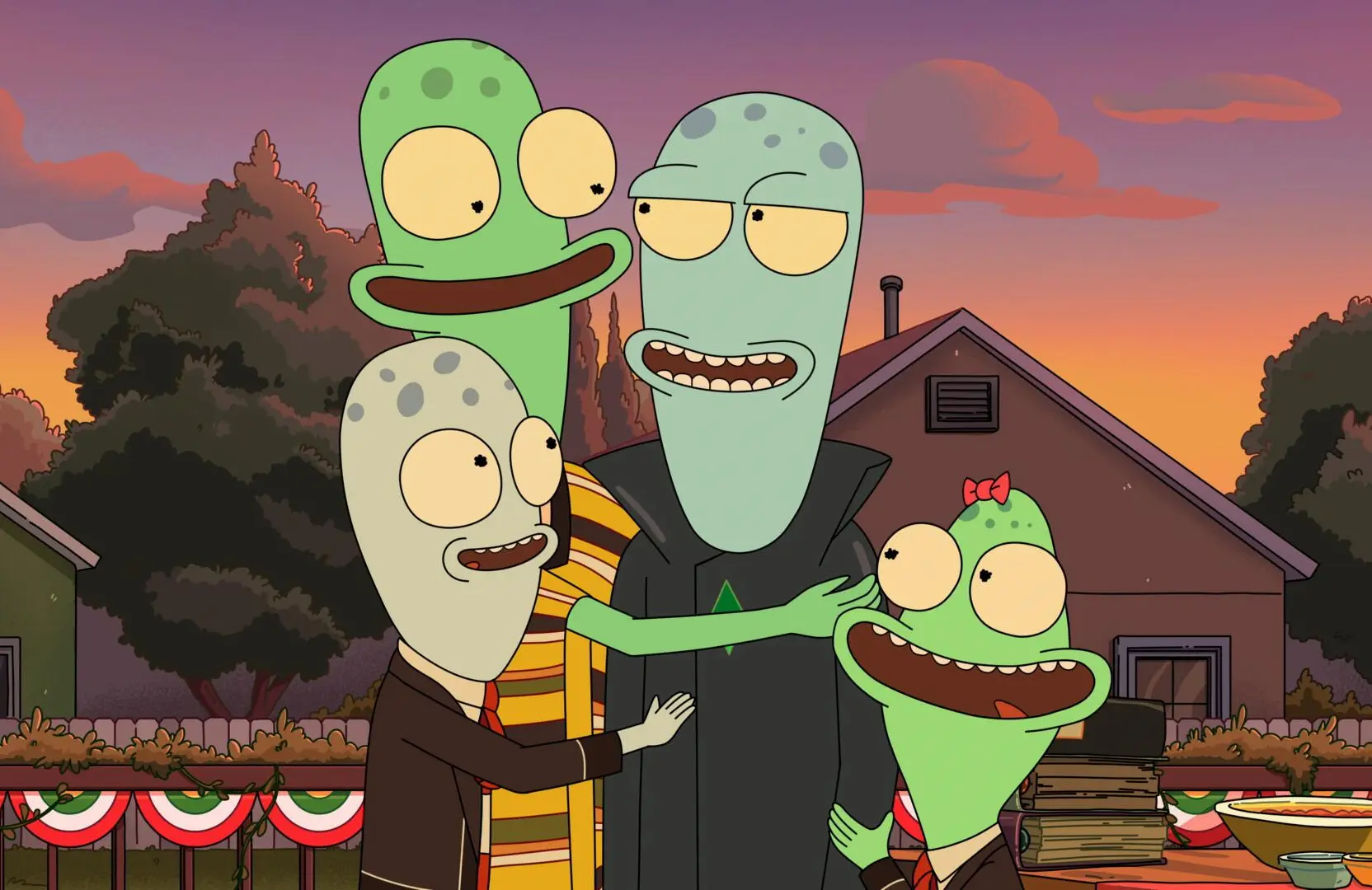Solar Opposites Brings the Demented Humor of Rick & Morty to Hulu
-
 Solar Opposites (Hulu)
Solar Opposites (Hulu)With Rick & Morty, Justin Roiland co-created (along with Dan Harmon) an adult-oriented animated series for the ages. Or for one particular age, really, as Millennials flocked to the sci-fi series about an eccentric old scientist who embarks upon inter-dimensional misadventures with the help of his fretful young grandson. Now, Roiland, along with fellow Rick & Morty writer Mike McMahan, have arrived at Hulu with Solar Opposites, a show with a very Rick & Morty vibe that Hulu surely hopes will attract significant chunks of the Rick & Morty audience.
Among its other virtues, Solar Opposites gives its audience the gift of an opening credits theme that lays out the premise of the series rather succinctly: "Planet Schlorp was the perfect utopia until the asteroid hit. One hundred adults and their replicants were issued a pupa and escaped into the Space searching for new homes on uninhabited worlds. We crashed on earth, stranding us on an already overpopulated planet." The aliens in question crash-landed — literally, as in the spaceship remains smashed atop the house — in the middle of American suburbia. There, adults Korvo (voiced by Roiland, who also voices both Rick and Morty on his other show) and Terry (Thomas Middleditch) live with their younger replicant charges Yumyulack (Sean Giambrone) and Jesse (Mary Mack), plus the aforementioned pupa, who acts as the baby of the family.
Korvo, who dresses in formal Schlorpian robes and hates Earth and humans, is task oriented and looking to get them off Earth and back to a planet that isn't already dying. Terry, on the other hand, is fond of t-shirts and TV and is taking to life on Earth much better. Yumyulack and Jesse attend the local high school and try to resist the temptation to use alien tech to deal with the bullies at school, though they have definitely fallen into the habit of shrinking adults and depositing them into the elaborate terrarium they have in their bedroom. The familial setup (Terry and Korvo share a domestic partnership that isn't romantic in any Earth sense but do outwardly seem like a couple of queer parents) allows Solar Opposites to play off of familiar alien-next-door sitcom tropes established by shows like 3rd Rock from the Sun, ALF, and the short-lived ABC series Neighbors. The series premiere, in fact, tackles a pretty direct ALF parody, then takes it into the kind of bizarre, chaotic, violent directions you might expect from the guys behind Rick & Morty.
At its best, Solar Opposites succeeds as a smart-assed culture-clash comedy with the aliens alternately celebrating and struggling with Earth culture. Korvo, the grumpus, hates everybody but is dismayed to realize that nobody likes him much either, so he and Terry embark on a quest for friendship and standing in the local community, albeit with the use of their own alien tech. Terry's easy acceptance and immersion into pop culture is mined endlessly for jokes, and his natural clashing with Korvo has a familiar buddy-comedy vibe that is tried and true for a good reason. The alien lore is kept tantalizingly at the margins, as is the enigmatic pupa, which more often that not enjoys a Maggie Simpson-esque autonomy of adventures where nobody else seems to be paying attention. (The pupa is intended to one day evolve into its full form and as a result terraform all of Earth, but that information is merely tossed off as an eventuality.)
Your mileage will likely vary on the show's frequent use of incredibly graphic violence as the endpoint of the various sitcommy adventures. Storylines that begin as conventionally as Terry and Korvo becoming obsessed with a TV show, or Yumyulac and Jesse attending a popular-kids party inevitably end up mired in some horrible violent mess that the aliens have to solve. It's a fine way to stick an elbow into the ribs of sitcom tropes, but at some point it begins to feel perfunctory. There's also the show's frequent detours into a side story involving the humans that Yumyulac and Jesse shrink and place in their terrarium, an Escape from New York-esque dystopian quest that sits in an odd no-man's-land between toss-off non sequitur and legitimate subplot. These scenes are clever, and curiously well cast (listen for the voices of Alfred Molina and Christina Hendricks, joining the likes of June Squibb and Tiffany Haddish among the show's starry guest voices), but the neither-fish-nor-fowl nature of these scenes make it hard to really get invested.
All in all, Solar Opposites has a fun time playing in the sandbox of the Rick & Morty visual style, while working diligently to carve out its own characters and scenarios. If the show's edge — not exactly nasty, but certainly not sweet — works for you, and if the hyper-violence is something you dig, Hulu just might have a big success on their hands.
All eight Season 1 episodes of Solar Opposites drop on Hulu today.
Will you be watching Solar Opposites? We've created a new discussion area for the show in our forums. Please join us there.
Joe Reid is the senior writer at Primetimer and co-host of the This Had Oscar Buzz podcast. His work has appeared in Decider, NPR, HuffPost, The Atlantic, Slate, Polygon, Vanity Fair, Vulture, The A.V. Club and more.
TOPICS: Solar Opposites, Hulu, Rick and Morty, Justin Roiland, Mike McMahan, Thomas Middleditch
- Solar Opposites' Damage Control Worked, But Should It Be So Easy to Separate an Abusive Creator From Their Show?
- Billions' Power Players Aim for World Domination in the Final Season
- New Allegations Reveal Justin Roiland Created a Toxic Work Environment From the Start
- Vampires, Werewolves, and Jack Osbourne: Our Guide to the Best of Halloween TV 2022